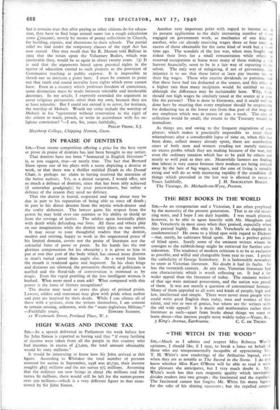HIGH WAGES AND INCOME TAX Sta,—In a speech delivered in
Parliament the week before last Sir John Simon is reported as having said that "if every farthing of income were taken from all the people in this country who had incomes in excess of £2,000, the total amount obtainable would be sixty millions."
It would be interesting to know how Sir John arrived at this figure. According to Whitaker the total number of persons assessed for surtax in September, 1938 was 97,750, their income roughly 483+ millions and the net surtax 57+ millions. Assuming that the ordinary tax now brings in about 18o millions and the surtax 8o millions, there would still be left for the surtax-payers over zoo millions—which is a very different figure to that men- tioned by Sir John Simon.
Another very important point with regard to income ta:, is its present application to the daily increasing number of t'ose engaged on government work, as mechanics of one kind or another, who are already receiving wages three or four time: in excess of those obtainable for the same kind of work but a s,:on time ago. The scandals of the last war, when men fought :-rx1 risked their lives for a small remuneration while other'. reserved occupations at home were many of them making a :ich harvest financially, seem to be in a fair way of repeating th.m. selves. The only way of mitigating, if not of preventing, is injustice is to see that these latter at least pay income tax on their big wages. Those who receive dividends or pensions :-,nd that these have had tax deducted at the source, and this often a a higher rate than many recipients would be entitled to ray, although the difference may be reclaimable later. Why, then, should not high wages be similarly taxed at the source at a time like the present? This is done in Germany, and it could well be done here by enacting that every employer should be responsible for deducting tax at the lower rate from that part of the wage of any employee which was in excess of 50s. a week. The cost of collection would be small; the return to the Treasury would be immediate.
As things are, and owing to the frequent migrations of em- ployees which makes it practically impossible to trace their whereabouts after a considerable lapse of time or, when this has been done, collect money already spent, there are numberless cases of both men and women evading not merely taxation on excess profits which they are making because of the war, but even the ordinary taxation which has to be paid by others not nearly so well paid as they are. Meanwhile farmers are finding that labour is very scarce because their workers are being enticed away by the lure of big wages, and. the cost of living is steadily rising and will do so with increasing rapidity if the condition of things which prevailed in the last war is allowed to recur.—


































 Previous page
Previous page